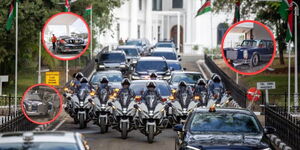High Court has deduced that a child bearing a different name is not proof enough to order a DNA test.
Justice John Onyiego of the family division court, on Wednesday, September 14, argued that a court cannot be convinced to rule that a child was born out of wedlock if it bears a different name from the father.
The child whose identity was questioned bore a Luhya dialect name while the father had that of Luo origin.
In a ruling which set precedence in child paternity cases, Onyiego added that bearing a different name was not proof that a child was born out of wedlock.
Appearing before the judge was a parent who wanted the court's intervention after he suspected that the child was not his.
The child, the court heard, was named after his maternal uncle.
In his argument, the aggrieved father told the court that the mother ignored Luo traditions while naming the child. The man had filed an appeal at the High Court after a lower court ruled in the favour of the child's mother.
However, Justice Onyiego agreed with the magistrate court verdict, which ruled that the child was born when the two were still cohabiting.
"I do agree with the magistrate that not giving the child a Luo name, the appellant’s tribe, is quite trivial in my opinion. It does not form a concrete basis for a DNA examination to be ordered," Onyiego stated.
The husband was also contesting over Ksh8,000 monthly upkeep, which the estranged wife demanded after their separation in 2017.
"Is the amount of Ksh8,000 excessive in the circumstances?... Courts do not make maintenance orders only against parents in formal employment. Given the rate of inflation since the impugned orders were made, I do not find the amount excessive," the court added.
In February 2022, Justice Onyiego ruled that children cannot be denied the right to inheritance due to parents' failure to formalise their union.
In the case, a widow and her two children had been disinherited for being non-Muslims and was not married under Islamic law.
"Since paternity is not denied or challenged, failure by the children’s parents to formalise their marriage cannot be visited on them to deny them what they are, by law, entitled," the judge observed.
Following the ruling, Onyiego ordered that the property of their deceased father was entitled to be distributed equally.












